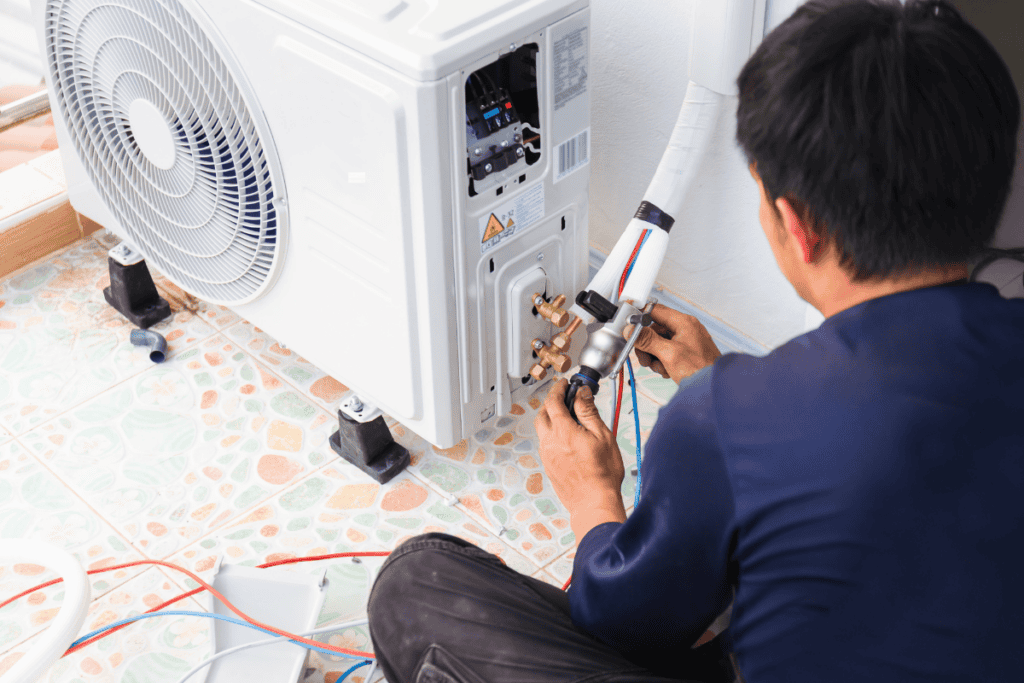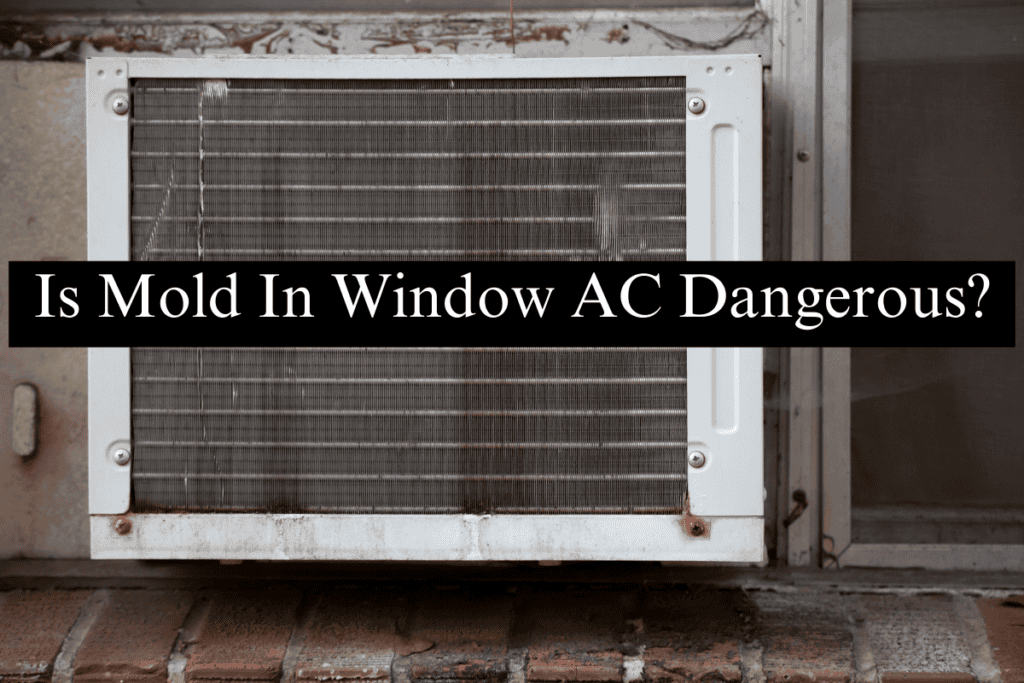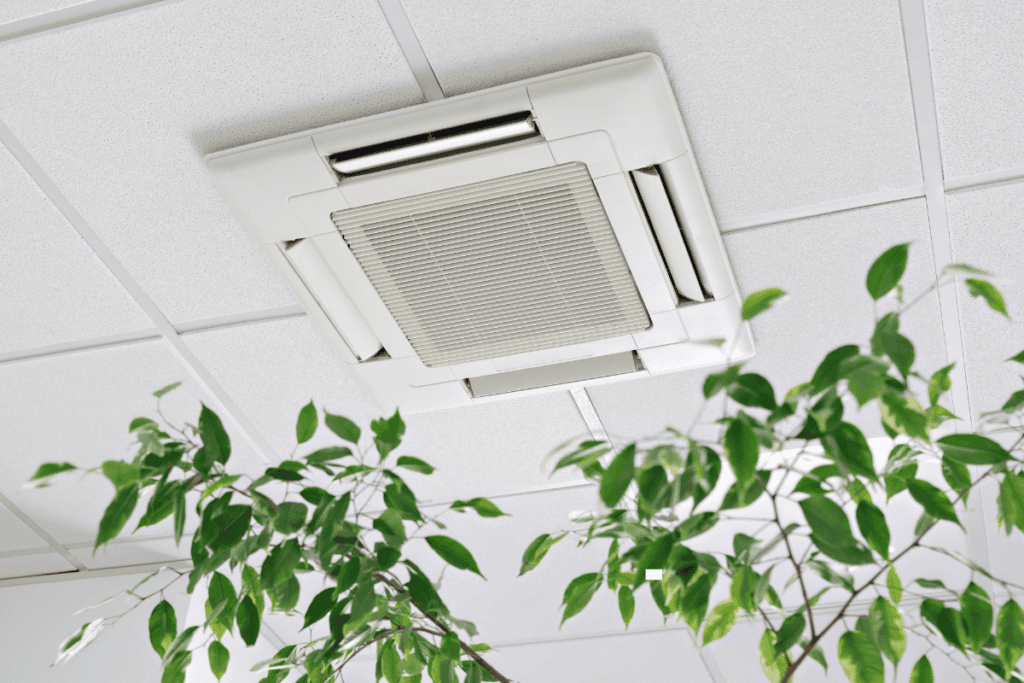Click, click, click. Is that the sound your AC making? It’s telling you that something isn’t quite right.
While a brief clicking sound during startup is a normal part of your thermostat communicating with your AC, persistent or loud clicking, while the system is running can be a cause for concern.
A constant clicking noise beyond the usual startup sequence is your air conditioner’s way of signaling that something is wrong.
Ignoring these warning signs can lead to more severe issues and costly repairs down the line.
In this comprehensive guide, we will diagnose the top 6 reasons behind an AC producing a clicking noise when turned on and provide you with the knowledge to take appropriate action to resolve the issue.
Contents
- 1 1. Loose Parts in the Compressor
- 2 2. Electrical Issues In Your Air Conditioner
- 3 3. Your Blower Fan Is Loose
- 4 4. Faulty Thermostat
- 5 5. Mechanical Problems In Your AC Unit
- 6
- 7 6. Malfunctioning Capacitor
- 8 Other Air Conditioning Sounds That Usually Indicate a Problem
- 9 Need Expert Assistance? Call HVAC Angel
- 10 Frequently Asked Questions (FAQs)
1. Loose Parts in the Compressor
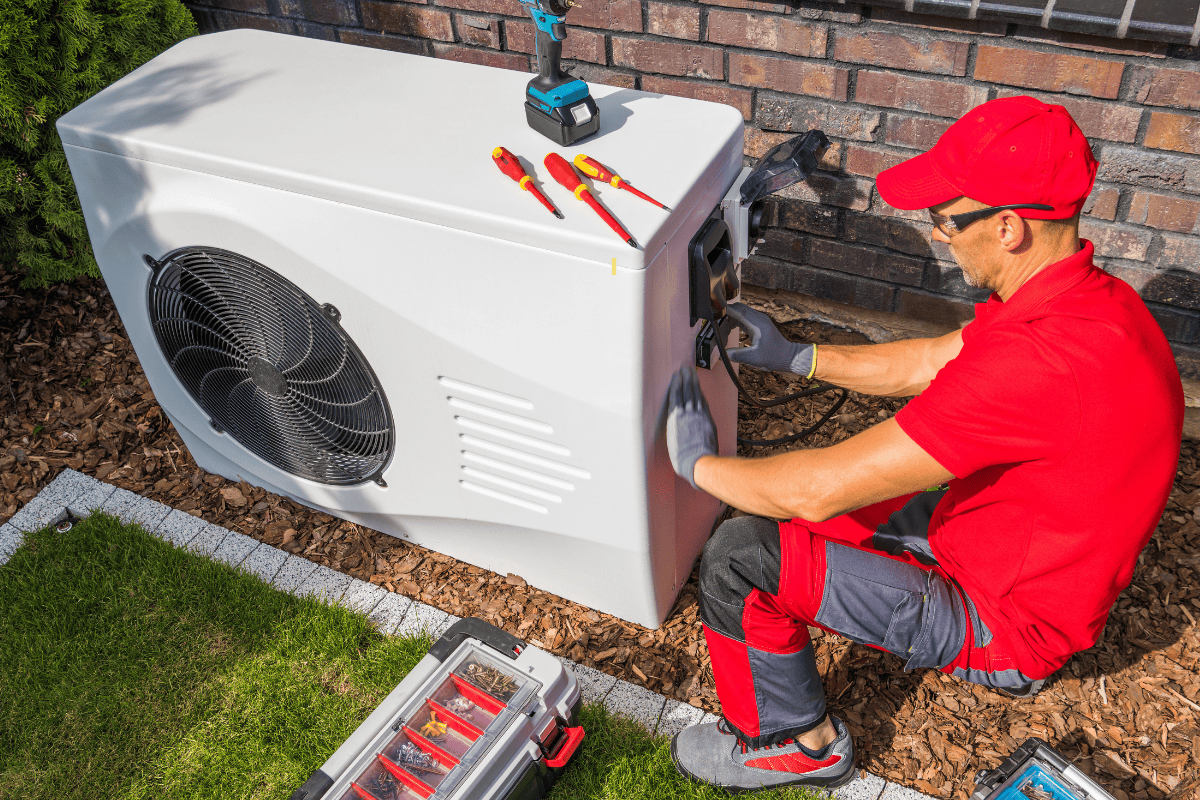
One of the most common reasons for your cooling system producing a clicking noise is a failing compressor. It is the heart of your air conditioning system, responsible for circulating refrigerant and maintaining proper cooling.
When loose parts, such as unsecured bolts or flexible refrigerant tubing, cause it to malfunction, it can result in a clicking sound accompanied by vibrations.
If you suspect that your AC’s clicking is due to compressing unit issues, address the problem immediately. A failing compressor system can lead to reduced cooling efficiency and, if left unchecked, may require a complete replacement.
When selecting a new compressor, opt for one with a high Seasonal Energy Efficiency Ratio (SEER) rating for optimal energy efficiency and performance.
2. Electrical Issues In Your Air Conditioner
When your air conditioner is functioning properly, you may hear clicking each time the indoor temperature rises and the unit turns on. But if you hear a click but your air conditioner fails to start, it’s likely that you have an electrical problem. This issue can be caused by a variety of factors, including a faulty thermostat, a tripped circuit breaker, or a problem with the capacitor or relay.
Electrical issues can be frustrating and may prevent your unit from effectively cooling your home.
Solution
If you suspect that the sound is due to an electrical issue, there are a few steps you can take as a homeowner to troubleshoot the problem:
1. Check your thermostat: Make sure your thermostat is set to “cool” and the temperature is set below the current room temperature. If the thermostat is not functioning properly, try replacing the batteries or resetting the device.
2. Inspect your circuit breaker: Locate your home’s electrical panel and check if the circuit breaker associated with your unit has tripped. If it has, switch it back on and see if your system starts running.
3. Clean the condenser unit: Debris and dirt can accumulate around your outdoor condenser unit, causing it to overheat and triggering electrical issues. Clean the area around the unit and remove any obstructions to ensure proper airflow.
3. Your Blower Fan Is Loose
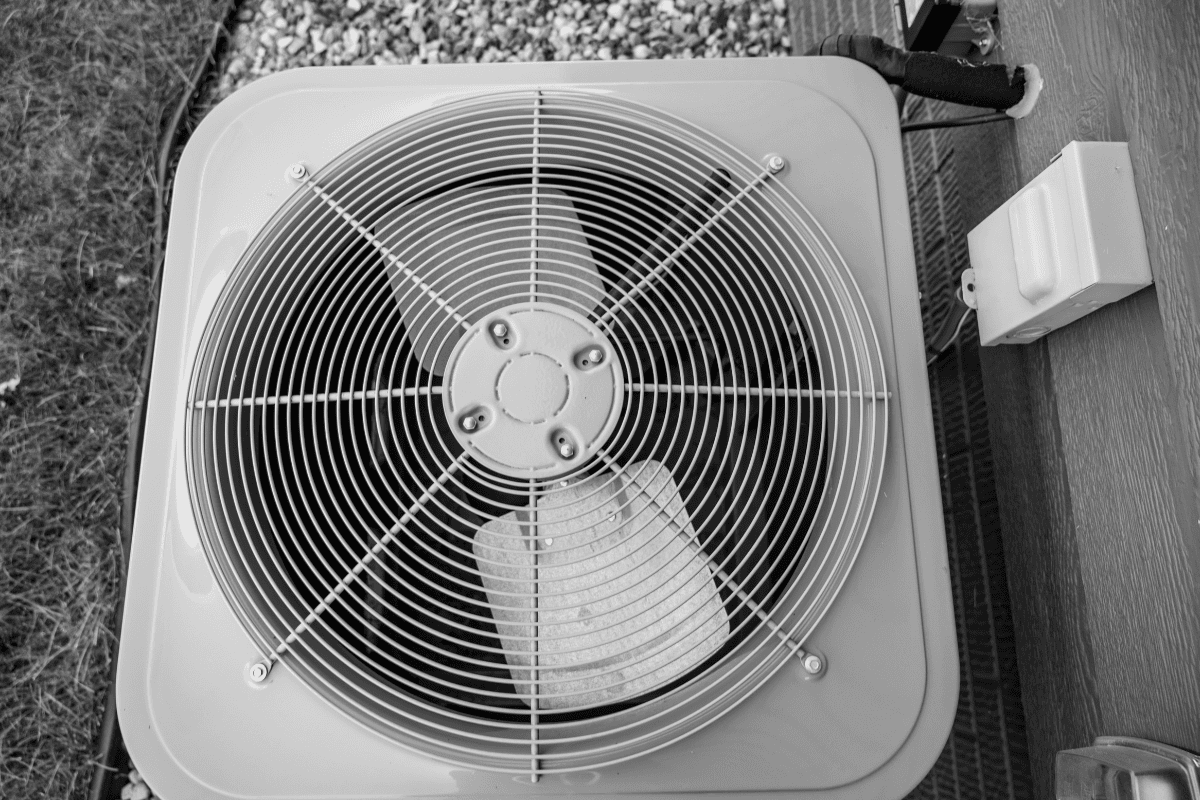
Clicking coming from your outdoor unit may indicate a problem with the fan. If the fan becomes loose, it can hit the casing of the unit, causing a loud clicking or tapping sound. This issue not only creates an annoyance but can also lead to damage to the fan blades and the interior of the unit, ultimately limiting the cooling ability of your air conditioning system.
Solution
As a homeowner, you can take the following steps to address a loose fan in your outdoor unit:
1. Turn off the power: Before attempting any repairs, switch off the power to your air conditioner at the circuit breaker to avoid any electrical hazards.
2. Inspect the fan: Visually inspect the blades for any signs of damage or looseness in the outdoor ac unit. If you notice any bent or cracked blades, they may need to be replaced.
3. Tighten the blade: If the blade appears loose, locate the set screw that holds it in place on the motor shaft. Using an appropriate screwdriver, carefully tighten the set screw to secure the blade.
4. Check for obstructions: Make sure that there are no debris or other objects obstructing the fan’s movement. Remove any items that may be causing the fan to hit the unit’s casing.
4. Faulty Thermostat
When your air conditioner is functioning properly, you should hear a soft clicking as your thermostat signals your unit to start up. However, if you notice a persistent clicking noise coming from your thermostat, it may indicate a problem with the relay or wiring.
A broken wire can cause the relay to continuously open and attempt to send power to your air conditioner, even if the system is unable to start. This results in an ongoing AC relay clicking sound, which can be bothersome and indicative of a malfunctioning thermostat.
Solution
If you suspect that the clicking noise is due to a faulty thermostat, you can try the following steps:
1. Check the batteries: If your thermostat is battery-powered, try replacing the batteries with fresh ones. Low battery power can sometimes lead to clicking or erratic behavior.
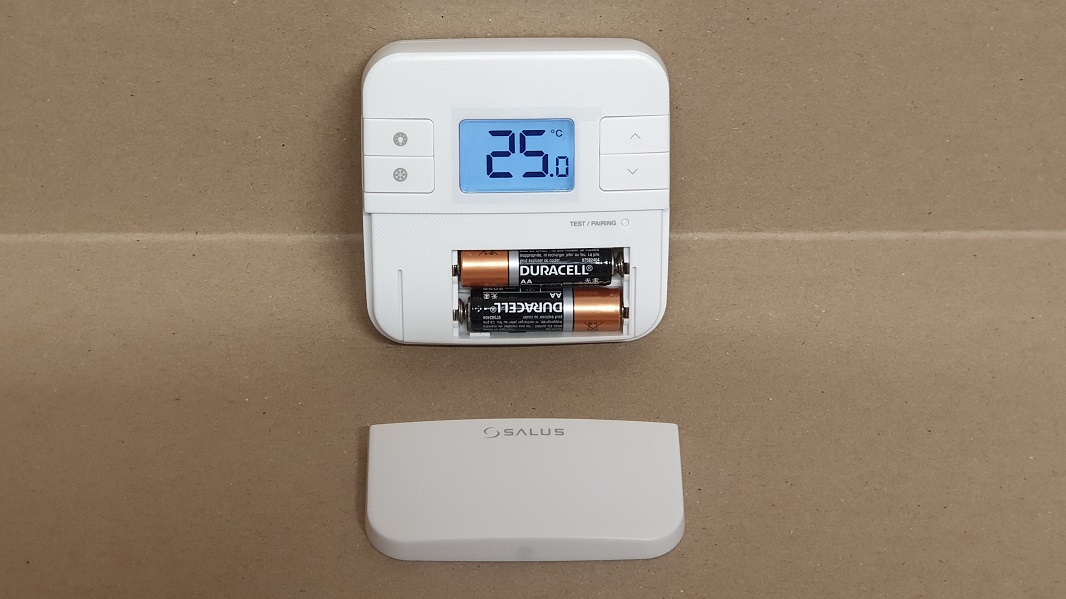
Source: Kitchen Heaters
2. Clean the thermostat: Carefully remove the thermostat cover and gently clean any dust or debris from the interior components using a soft brush or compressed air. Ensure that the contacts are clean and free of corrosion.
3. Upgrade to a smart thermostat: You may want to consider upgrading to a smart thermostat. Smart thermostats not only provide enhanced comfort and convenience but also save 10–15 percent of your energy needs, according to a study by Project Drawdown.
5. Mechanical Problems In Your AC Unit
As your air conditioner ages, various components may begin to deteriorate, leading to mechanical problems that can cause a clicking noise.
Loose or worn-out parts, such as blades, compressor mounts, or other moving components, can create cllicking when they fail to function properly.
If left unaddressed, these mechanical issues can lead to more severe damage to your system and may even result in a complete system breakdown.
Solution
If you suspect that your air conditioner is making clicking noise due to mechanical problems, act quickly to prevent further damage. As a homeowner, you can take the following steps:
1. Consider a system upgrade: If your air conditioner is relatively old and experiencing frequent mechanical issues, it may be more cost-effective to invest in a new, more efficient system. When selecting a new cooling system, look for units with a high Seasonal Energy Efficiency Ratio (SEER) rating.
We recommend choosing a 14 SEER system that uses R410 coolant, as these systems are more energy-efficient and environmentally friendly, in compliance with current government regulations.
2. Schedule professional maintenance: If your system has mechanical issues, it is better to contact an experienced technician rather than doing it yourself. They will assess the condition of your air conditioner, identify any worn-out or loose parts, and do necessary repairs or replacements to restore your system’s performance and eliminate the clicking noise.
6. Malfunctioning Capacitor
The capacitor, located on the side of your outdoor system, is essentially a large battery that provides the necessary power to start up your air conditioner and keep it running smoothly.
If you hear a clicking noise coming from your system, it could be a sign that the capacitor is failing to supply the required power for the system to boot up properly.
The lifespan of an AC capacitor can vary between 5-20 years, depending on factors such as the climate in your area and the level of maintenance your system receives. So, it is possible that your capacitor has run its course.
A poorly functioning capacitor can lead to reduced cooling performance, increased energy consumption, and potential damage to other components of your air conditioning system.
Solution
If you suspect that your AC’s clicking noise is due to a faulty capacitor, it’s essential to address the issue promptly to avoid further damage to your unit. Here are some steps you can take:
1. Visual inspection: Safely remove the cover of your outdoor system and visually inspect the capacitor for any signs of damage, such as bulging, leaking, or burn marks. If you notice any of these signs, it’s likely that the capacitor needs to be replaced.
2. Test the capacitor: If you have experience working with electrical components, you can use a multimeter to test the capacitor’s functionality.
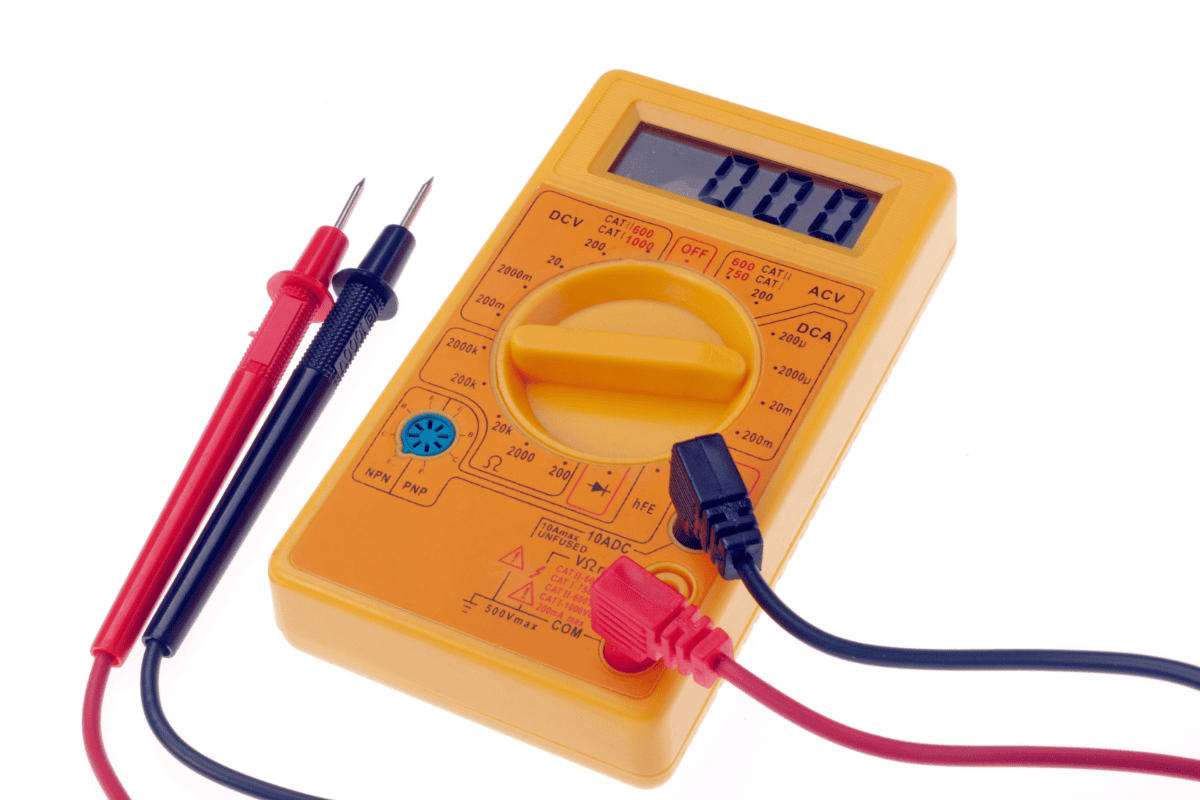
3. Replace the capacitor: If the capacitor is found to be faulty, it must be replaced to restore proper function to your air conditioner. On average, capacitor replacement costs between $150-$350, depending on the type of system you have and the number of capacitors that need to be replaced.
Other Air Conditioning Sounds That Usually Indicate a Problem
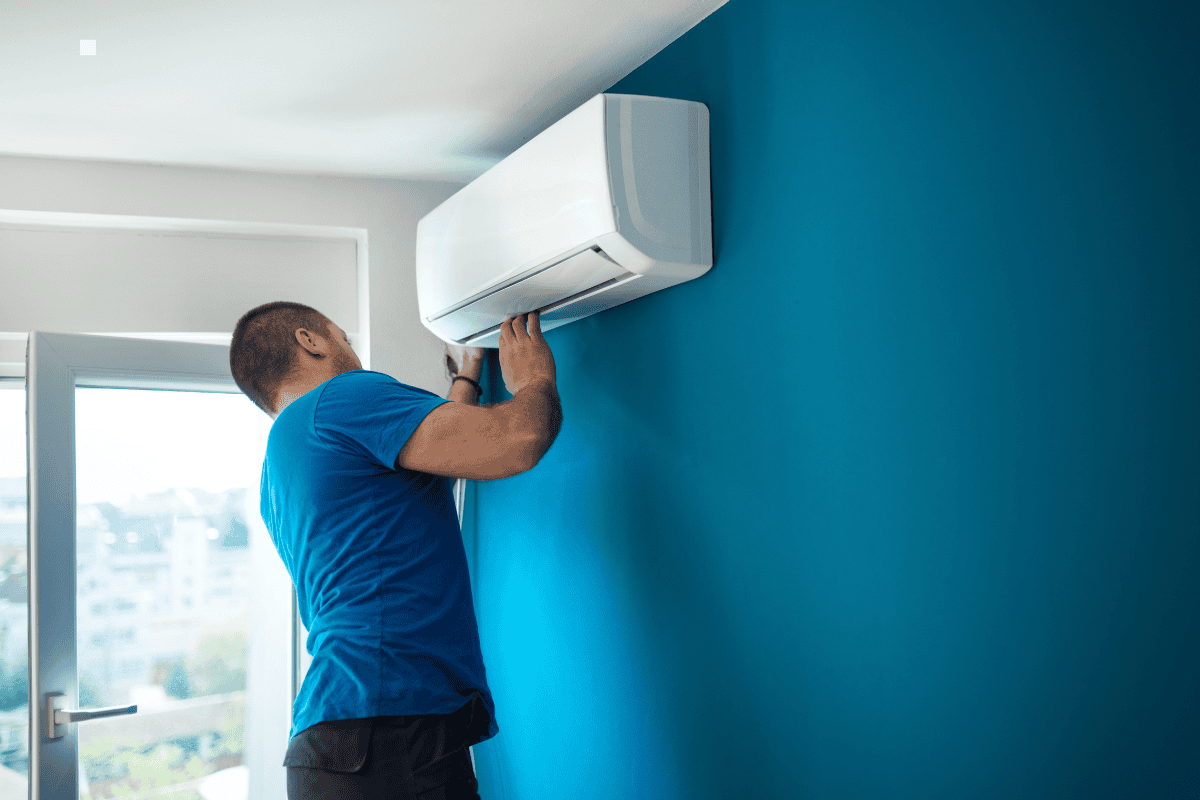
1. AC Popping Sound
A popping noise coming from your air conditioner may indicate issues with your ductwork. When air rushes into or out of the ductwork, it can cause popping sounds at the joints.
Repairing your ductwork will allow your AC system to work at its full capacity without wasting energy.
2. AC Hissing Noise
A hissing noise coming from your air conditioner could be a sign of a refrigerant leak. The refrigerant circulates through coiled tubing in your AC system, and hissing may indicate cracks or leaks in this coiling.
If the leak is substantial, you might hear a gurgling sound along with the hiss, which could indicate a more severe problem with your system.
If you hear a hissing noise from your air conditioner, it’s essential to contact a professional to recognize and fix the issue promptly.
Attempting to repair the leak yourself can be dangerous, as it may lead to toxicity, flammability, asphyxiation, and physical hazards, according to the Environmental Protection Agency (EPA).
3. AC Screeching Sound
A screeching or squealing noise coming from your air conditioner could indicate a problem with the fan motor or compression mechanism in your unit.
If the screeching sound continues for the entire time the system is running, it likely points to an issue with the fan motor itself. Wear and tear on the fan motor or belt can cause these unusual sounds and lead to reduced performance of your air conditioning system.
If the screeching stop once the system is fully powered up, it means your compressor is creating trouble.
Whatever the issue maybe, it is better to get it fixed as soon as possible.
4. AC Buzzing Noise
A buzzing noise coming from your air conditioner is usually a sign of danger.
One cause of buzzing could be a frozen system, which can lead to further damage to your air conditioning system if left unchecked. However, buzzing is also a significant clue of a potential electrical malfunction, which can be a serious safety hazard.
If you hear a buzzing noise from your air conditioner, the first step is to turn off the unit and look for signs of ice buildup.
If the issue is related to a frozen system, you should let the ice melt, before investigating further.
In the case of an electrical malfunction, contact a professional.
It’s essential to address any electrical issues promptly, as home electrical fires account for over 50,000 of the total fires in the US every year, according to the Electrical Safety Foundation International (ESFI).
5. AC Banging Noise
A banging noise is a clear indication that something has come loose inside the unit. The loose component could be hitting a crucial part of the internal equipment, causing damage to your AC and potentially leading to a breakdown.
This issue requires immediate assistance from an HVAC professional to prevent further harm to your air conditioning system.
6. AC Rattling Noise
A rattling noise coming from your system is a sign of wear and tear or something loose within your unit. This unusual sound could indicate that a component inside your AC has come loose and is moving around, potentially causing damage to other parts of the system.
If left unaddressed, a rattling noise can lead to more serious problems with your air conditioning system, reducing its efficiency and lifespan.
7. AC Squealing Noise
A high-pitched squealing noise coming from your system indicates that your unit is under great pressure. This excessive internal pressure can cause damage to your AC, and although it may not result in permanent harm, it’s essential to address the issue promptly.
In most cases, the squealing noise is caused by a failing compressor, which will need to be replaced to resolve the issue permanently.
Attempting to clean the compressor will only provide a temporary solution, and the squealing will likely return at a later point.
Need Expert Assistance? Call HVAC Angel
At HVAC Angel, we pride ourselves on being the best choice for all your air conditioning repair needs.
Our team of highly skilled and experienced HVAC technicians has the expertise to tackle any problem with your air conditioning system. Whether you hear a persistent clicking sound, notice a loud bang, or detect a strange odor coming from your system, we have the knowledge and tools to identify the root of the problem and provide effective solutions.
Don’t let a clicking noise or any other concerning sound from your system cause you stress or discomfort.
Contact us today to schedule an appointment with one of our friendly and knowledgeable HVAC professionals. We’ll work diligently to diagnose and fix the issue, ensuring that your AC system operates efficiently and reliably for years to come.
Frequently Asked Questions (FAQs)
1. Why is my air conditioner making a clicking noise?
When your system is producing a clicking noise, it could indicate a problem with the compressor, blade, or electrical components such as the capacitor. It is recommended to contact a technician to recognize and fix the issue.
2. What should I do if my ac unit is making clicking sounds?
If your system is making clicking sounds, it may be a sign of a faulty thermostat or control board. It is best to have an HVAC technician inspect the unit and perform any necessary repairs for proper functioning.
3. How can I troubleshoot if my air conditioner is making noise?
If your system is making noise, you can check for any obstructions in the fan blade, loose parts, or a faulty capacitor. For more complex issues, it is advisable to seek the help of a qualified technician to address the problem effectively.
4. What are the possible causes if my ac unit won’t stop clicking?
If your system won’t stop clicking, it could be due to a malfunctioning relay, electrical issue, or a problem with the compressor. AC repair may be necessary to resolve the issue and prevent further damage.



